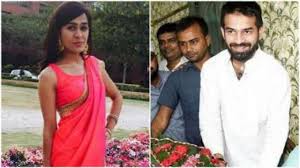Tej Pratap’s ex-wife speaks: ‘Why was my life ruined? Why was I beaten?’

The political family of Bihar has always attracted public attention. However, personal family issues rarely come to light so openly. Recently, Aishwarya Rai, the former wife of Rashtriya Janata Dal (RJD) leader Tej Pratap Yadav, shared her painful experiences during their marriage. Her candid words expose a troubling reality behind political alliances and raise important questions about domestic violence and personal dignity in powerful families.
The Marriage That Captured Headlines
In 2018, Aishwarya Rai and Tej Pratap Yadav tied the knot. Many regarded their marriage as a political alliance between two influential families in Bihar. Tej Pratap, son of former Chief Minister Lalu Prasad Yadav, is a prominent political figure. The wedding was widely celebrated, and people expected them to become a powerful political couple.
Behind the celebrations, however, the reality was quite different. Over time, reports about conflicts and troubles began to surface. Eventually, much more serious and disturbing facts emerged.
Aishwarya’s Painful Revelation
Recently, Aishwarya Rai spoke out with deep emotion. She asked, “Why was my life ruined? Why was I beaten?” These words reveal the immense suffering she endured. According to her, Tej Pratap and his family subjected her to mental and physical abuse. She claimed they mistreated her and used her as part of a political show. Furthermore, she explained that the happy marriage shown to the public was only a facade. Behind closed doors, she faced violence and neglect.
The Legal Battle and Court Rulings
Rather than remain silent, Aishwarya took legal action. She filed a complaint under the Protection of Women from Domestic Violence Act. Subsequently, the Patna court found Tej Pratap guilty of domestic violence and issued protection orders in her favor. This ruling provided her some relief and sent a strong message that women’s rights must be respected, regardless of the accused’s status.
Political Drama or Personal Tragedy?
The situation escalated when Tej Pratap posted a “relationship confession” on Facebook. He later claimed that hackers made the post. This incident sparked a political uproar, leading to his expulsion from the RJD. In addition, his father, Lalu Prasad Yadav, publicly distanced himself.
Aishwarya alleged that the family used the situation for political gain. She said they staged a “fake drama” just before elections. This tactic distracted the public from the real issue — her suffering. She felt that her pain was exploited, which only deepened her hurt.
This public battle reveals how political families sometimes use personal problems as strategic tools. Sadly, real emotions and dignity often get lost in such power struggles.
The Emotional Toll and Societal Reflection
Aishwarya’s story extends beyond her individual pain. It highlights a widespread problem: the silence surrounding domestic abuse in India. This silence exists even in influential families. Her courage offers hope to other women who suffer quietly. Many victims stay silent due to social pressure or lack of support. By speaking out, she gives them a voice.
Her case urges society to rethink how it addresses domestic violence. Are victims receiving sufficient help? Families and politicians must prioritize dignity and justice. Moreover, her story challenges the authenticity of public displays of loyalty and unity in political dynasties.
Public and Media Response
The public and media responded in various ways. Many sympathized with Aishwarya and praised her bravery. On the other hand, some viewed the accusations as political infighting. Regardless, her voice shifted public discourse and sparked conversations about the intersection of politics and personal lives.
Women’s rights organizations welcomed her courage. They urged society to focus on victims’ welfare rather than the political drama.
What Lies Ahead?
The drama between Tej Pratap and Aishwarya is far from over. The courts continue to hear the case, and political repercussions persist within the RJD and Bihar politics.
More importantly, Aishwarya’s story might encourage others to come forward. It highlights the urgent need for stronger protections for women everywhere, regardless of their social standing.
Conclusion
By choosing to speak up, Aishwarya Rai sheds light on domestic violence in political families. Her question, “Why was my life ruined? Why was I beaten?” transcends personal pain. It becomes a call for awareness, empathy, and change.
Her story reminds us that behind power and politics, real struggles exist. It calls on legal systems and politicians to put human dignity first.
As political and legal battles continue, the hope remains that her voice will inspire positive change. Above all, it can offer hope to many others who suffer in silence.






